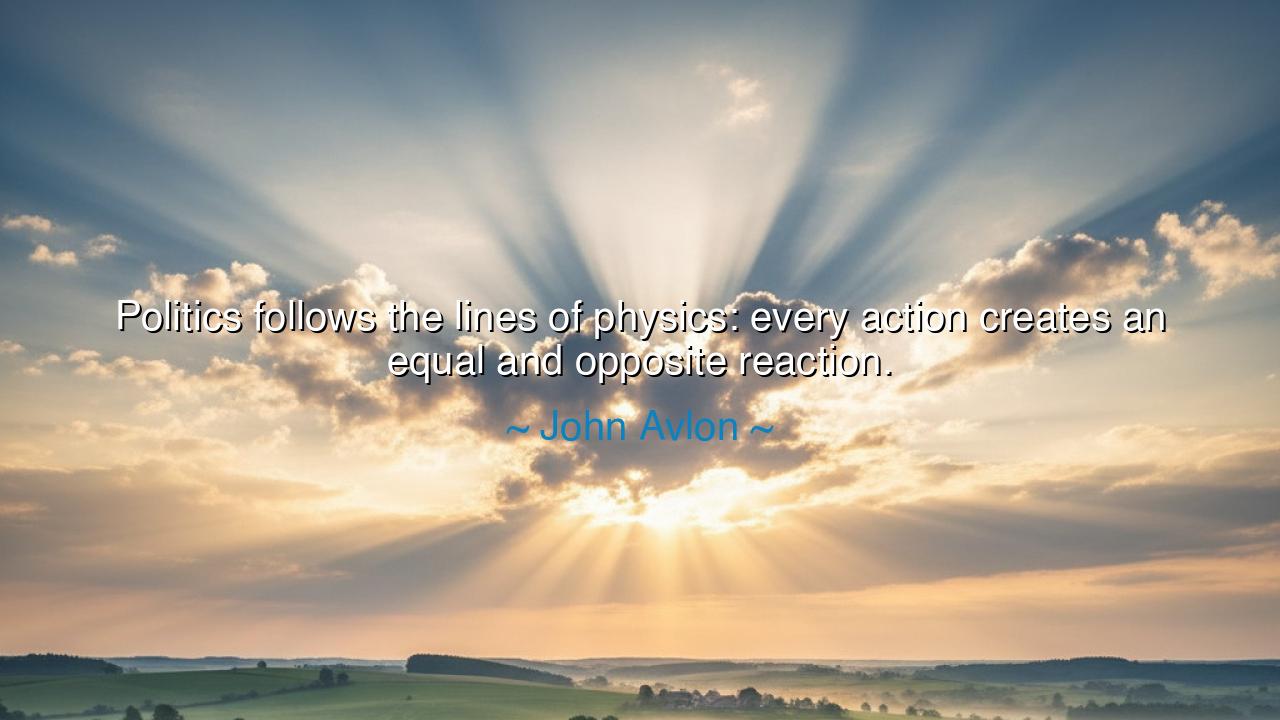
Politics follows the lines of physics: every action creates an
Politics follows the lines of physics: every action creates an equal and opposite reaction.






Hear, O seekers of wisdom, the discerning words of John Avlon: “Politics follows the lines of physics: every action creates an equal and opposite reaction.” In this saying, he weds the laws of nature to the laws of men, teaching that the struggles of politics obey the same rhythms as the universe itself. Just as Newton declared that force begets counterforce, so too does every policy, every decree, every ambition awaken a reaction equal in strength, opposite in direction.
For power never moves in silence. When rulers push too hard, the people push back; when laws oppress, resistance rises; when injustice spreads, movements for justice ignite. Thus, the wise statesman must not only consider the action he takes, but also foresee the reaction it will awaken. To ignore this law is folly, for history is full of those who thought themselves secure, only to be swept away by the storm they themselves had stirred.
Consider the tale of the French Revolution. The monarchy, entrenched in wealth and privilege, pressed ever harder upon the poor with taxes and disdain. Their action was the oppression of the masses, but the reaction was an uprising that toppled the throne, sent nobles to the guillotine, and reshaped the nation. The very excess of royal pride summoned its opposite: the fury of the people. Avlon’s truth shines here—politics is bound to this eternal law of balance.
So too in more recent times. In America, the struggle for civil rights emerged as a reaction to centuries of segregation and inequality. The more resistance met the marchers, the stronger their determination grew. Police dogs, fire hoses, and beatings did not extinguish the cause, but rather magnified its urgency, drawing the conscience of the world to their side. Here again, each action of oppression begot an opposite reaction of freedom.
Therefore, O children of the future, let this be your lesson: in politics, as in the cosmos, no force moves without awakening another. The wise do not govern as if their word ends the matter; they govern knowing that each act sends ripples across the waters of society. To wield power is to summon opposition; to pursue justice is to provoke resistance. But in this balance lies the movement of history itself—the eternal dance of action and reaction, which carries humanity forward.






TCHoang T Chuc
The quote about politics following the laws of physics is intriguing but also raises a lot of questions. How often do political decisions truly create an ‘equal and opposite reaction’? Does this principle apply only to large-scale political decisions, or does it apply to everyday political interactions as well? And if every action provokes a reaction, how do we build policies that minimize harm and encourage more positive outcomes?
HNHiéu Nguyẽn
Avlon’s comparison of politics to physics makes me think about how political actions often lead to unintended consequences. Is there a way for leaders to anticipate the reactions to their decisions and account for them in a way that avoids negative backlash? Or are political decisions too complex to anticipate every possible reaction, especially in an increasingly globalized and interconnected world?
NQNguyen Ngoc quoc
The analogy of politics following the lines of physics is interesting, but does it oversimplify political dynamics? While it's true that every action can provoke a reaction, can we truly predict the scale of the backlash? In today’s fast-paced, media-driven world, does the ‘equal and opposite’ reaction always come in a predictable or manageable form? How do politicians and activists navigate this principle without becoming paralyzed by fear of backlash?
LDKhanh Linh Dinh
Avlon’s statement about the balance between action and reaction in politics reflects the idea that political decisions are often met with resistance. But in a polarized world, is this dynamic always destructive? How do we differentiate between healthy opposition that leads to progress and harmful resistance that stalls change? Can this principle be used to understand how political polarization escalates, or does it oversimplify the complexities of modern governance?
SNShamanVN Nguyen
The quote suggests that political actions, like physical actions, have inevitable consequences. But does this always hold true, or are there times when political movements or actions manage to break the cycle of opposition? Could this principle of ‘equal and opposite reactions’ encourage more cautious, strategic political decision-making, or does it hinder bold, necessary reforms that could lead to long-term positive change?